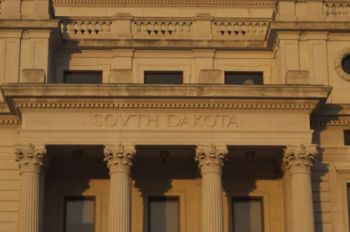The Gift of South Dakota
Subscriptions to South Dakota Magazine make great gifts!
Subscribe today — 1 year (6 issues) is just $29!
Less Democracy in S.D.?
Jan 23, 2013
While I try to promote democracy, South Dakota's Legislature tries to hamstring it.
Exhibit 1: Senate Joint Resolution 1 would change the terms and term limits of South Dakota's state senators. Right now, senators are elected every two years, just like members of the House. SJR 1 would create a mickey-mouse system under which we would elect senators for four-year terms in years ending in 2 and 6 and two-year terms in years ending in 0. The only apparent reason SJR 1 keeps that one short term is to avoid the complication of keeping senators in office if we redraw their district boundaries during the decennial redistricting.
SJR 1 removes two out of five opportunities we have each decade to fire senators whom we feel aren't serving our needs. In that regard, SJR 1 is undemocratic.
Exhibit 2: Senate Joint Resolution 2 would make it harder to impose new taxes in South Dakota. Our state constitution already requires a two-thirds vote from both the House and Senate to pass a new tax (an amendment minted in 1978, when Proposition 13 did the same thing in California). However, if we the people want to raise some revenue, we can put a tax increase on the ballot by initiative and pass it with a simple majority.
SJR 2 extends the two-thirds rule to tax initiatives. SJR 2 would thus make it harder for a democratic majority to work its will. SJR 2 is thus undemocratic.
Exhibit 3: Surprise! Senate Bill 70, the Governor's corrections reform bill, has enough sponsors to pass it today in both houses. It also has Sections 71 through 75 to make it harder for voters to monkey with the Governor's reform plans via later initiatives. Section 71 requires that any initiative affecting prison populations, like a bill that defines a new crime and proposes jail time as a penalty, must include a financial impact statement.
That seems harmless enough: knowing what a new law could cost isn't a bad idea, and state agencies will do that number-crunching for initiative activists.
But here's the rub: the Attorney General must include that fiscal note in the paperwork the Secretary of State must approve before the initiative's backers can circulate petitions to put the measure on the ballot. Now it may take our diligent bureaucrats in Pierre just a couple weeks to put together a fiscal note, but a couple weeks is valuable petitioning time. SB 70 thus makes it harder to place an initiative on the ballot. These five sections of SB 70 are thus undemocratic.
There may be other reasons to pass these bills, and I invite discussion of those reasons below. But if you dig democracy, you likely shouldn't dig SJR 1, SJR 2, and at least part of SB 70.
Editor's Note: Cory Heidelberger is our political columnist from the left. For a right-wing perspective on politics, please look for columns by Dr. Ken Blanchard every other Monday on this site.
Cory Allen Heidelberger writes the Madville Times political blog. He grew up on the shores of Lake Herman. He studied math and history at SDSU and information systems at DSU, and is currently teaching French at Spearfish High School. A longtime country dweller, Cory is enjoying "urban" living with his family in Spearfish.










Comments
Your "equal say" definition is flawed. Suppose the Governor dissolved the Legislature and declared himself king for life. Suppose every five years he allowed people to vote on a handful of symbolic issues that didn't threaten his autocratic power. The people would all have an equal say, but they'd have darn little say. That's not democracy. Democracy means we have equal and frequent say. SJR1 makes our opportunity to have a say less frequent. SJR1 thus weakens democracy.
Concurrent resolutions are the toothless pieces of fluff the legislators use to declare their opinions on issues they can't really do anything about, such as saying we like Israel or telling the U.S. Supreme Court to overturn Roe V. Wade.
Joint resolutions are used to put constitutional amendments on the ballot. The Legislature can't amend the state constitution itself, but it can submit amendments for the approval of the electorate.
SJR1 and SJR2 are joint amendments. They wouldn't make these changes happen, but they would give us the chance to make these changes happen. They express the Legislature's desire to weaken democracy... but they give us a democratic chance to vote on them.
I think South Dakota is still one of the best run States. Sit back and watch the Californias, Illinois, Michigan and others who have done it with mirrors for years and the mirrors are broken.
All States would benefit from SD term limits, even as adjusted... I wish the federal government would be the same as South Dakota - we would be a lot better off.
Believe me I know, I am now a Minnesotan.
South Dakotan's already voted out most of the bums and honyockers......as reflected in our legislative majority.